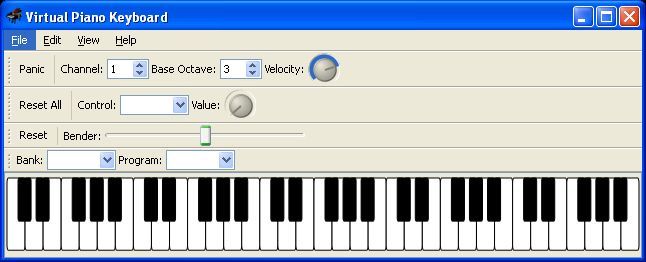

- #Virtual midi piano keyboard c64 soundfont install#
- #Virtual midi piano keyboard c64 soundfont software#
- #Virtual midi piano keyboard c64 soundfont free#
Oh, and one more thing, make sure you install the asio4all audio driver and use that one with your DAW, in order to get low audio latency. Born of a need for an instrument to play while away from home, the Pyano project hopes to allow musicians to express themselves with nothing more than a.
#Virtual midi piano keyboard c64 soundfont free#
In any case, whether you choose this one or a different soundfont plugin, as long as you use the right format (usually Win VST for Windows, AU or Mac VST for Mac), you shouldn't have any trouble running it with Reaper or any other DAW for that matter. Pyano is a free and open-source virtual MIDI controller program which allows you to use your keyboard (as in QWERTY keyboard) as a keyboard instrument (as in pianos, harpsichords, organs). rec: jack-midi-clock: JACK client that sends MIDI beat clock pulses. I can't check that right now, but hopefully, this is not the case with the version they have on vst4free. rec: jack-keyboard: Virtual MIDI keyboard for JACK MIDI. My only quibble about it is that a particular version of the plugin would cause audio dropouts when using it on multiple tracks on a multicore processor. But if you only need to load soundfont files into the plugin, I think sfz would be your safest bet. I remember seeing a few that had advanced sampling capabilities (I think Beat Zampler was one of them). I'm sure there are other good ones too, and probably most of them are newer, or at least they're still maintained by their developers. While it is no longer available on the Cakewalk website, there is a copy of it here. The midi Soundfonts - 8 bit sound (Simple waveforms, Nintendo Gameboy. It is simple enough to use, and has adjustable sound quality. It is similar to the PSID file format for C64 music/sound, where one rips the. But out of the ones I have tried, I've only kept Cakewalk's sfz plugin. I haven't tried all the available soundfont plugins so I can't really give you a completely unbiased opinion. The useful part about this setup is that, apart from just playing the sounds, you can also record and mix them using the DAW.
#Virtual midi piano keyboard c64 soundfont software#
So, a typical setup would be a midi keyboard or controller connected to a PC running a digital audio workstation (such as Reaper or LMMS), in which you've loaded a soundfont plugin (I personally use sfz, but there are others too - just search for "sf2 vst") finally, you have to load the soundfont into the soundfont plugin. Instead, you could connect your keyboard (or a midi controller) to your computer, and use it to control software virtual instruments (youll need usb-midi output on your keyboard for that though, so if you only have midi output, a midi to usb adapter should come in handy). Instead, you could connect your keyboard (or a midi controller) to your computer, and use it to control software virtual instruments (you'll need usb-midi output on your keyboard for that though, so if you only have midi output, a midi to usb adapter should come in handy). If it doesn't, you don't necessarily have to buy a dedicated piece of hardware specifically for that. If you are asking about loading soundfonts into a hardware keyboard you already have, you should check if your model has that capability.


 0 kommentar(er)
0 kommentar(er)
